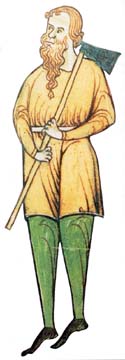Dairmait Mac Murchada
 Dairmait Mac Murchada, also known as Dermot MacMurrough, was allied with
Murtough MacLochlainn who was acknowledged as High King of Ireland in 1162.
However, Murtough was overthrown in 1166 by Rory O'Connor and his ally
Tiernan O'Rourke who seized the opportunity to settle an old score with
Dairmait MacMurchada. Apparently Dairmait had either carried off,
kidnapped, or otherwise had an affair with Tiernan's wife about fourteen
years earlier.
Dairmait Mac Murchada, also known as Dermot MacMurrough, was allied with
Murtough MacLochlainn who was acknowledged as High King of Ireland in 1162.
However, Murtough was overthrown in 1166 by Rory O'Connor and his ally
Tiernan O'Rourke who seized the opportunity to settle an old score with
Dairmait MacMurchada. Apparently Dairmait had either carried off,
kidnapped, or otherwise had an affair with Tiernan's wife about fourteen
years earlier.
Tiernan O'Rourke invaded Leinster,
and Dairmait Mac Murchada fled to England in search of allies. King
Henry II accepted Dairmait's allegiance, and gave him permission to recruit
among his subjects for an expedition to Ireland. Dairmait struck
a bargain with Richard FitzGilbert "Strongbow" deClare, 2nd Earl of Pembroke,
who invaded Ireland, married Dairmait's daughter Aoife, and became King
of Leinster when Dairmait died in 1171.
King Henry II, fearful that Strongbow
would set up an independent kingdom, came to Ireland to assert his authority
over the lands that had been occupied. The King granted Leinster
to Strongbow, Meath to Hugh de Lacy; and most of the Irish Kings quickly
recognised Henry as their overlord. The Norse towns were of vital
military and economic importance. King Henry annexed Dublin, Wexford,
Waterford, Cork and Limerick; and left garrisons in all of them.
Thus, Dairmait Mac Murchada is remembered
for having brought the English to Ireland and is generally held in low
esteem in Irish History.
His obituary from the Annals of the Four Masters
reads as follows:
Obituary of Dairmait Mac Murchada
| Diarmaid Mac Murchadha, King of Leinster, by whom a trembling
sod was made of all Ireland, - after having brought over the Saxons, after
having done extensive injuries to the Irish, after plundering and burning
many churches, as Ceanannus, Cluain-Iraird, &c., - died before the
end of a year after this plundering, of an insufferable and unknown disease;
for he became putrid while living, through the miracle of God, Colum-Cille,
and Finnen, and the other saints of Ireland, whose churches he had profaned
and burned some time before; and he died at Fearnamor, without making a
will, without penance, without the body of Christ, without unction, as
his evil deeds deserved. |
See the Annals of the Four Masters at http://www.ucc.ie/celt/published/T100005B/index.html
Click on Annal M1163 and scroll down to M1171.4, page 1183
Click to return to the Ireland
Page, or use your browser's back button.
Click
to Contact Robert Sewell
For lots more Irish History,
click on the image below:

 Dairmait Mac Murchada, also known as Dermot MacMurrough, was allied with
Murtough MacLochlainn who was acknowledged as High King of Ireland in 1162.
However, Murtough was overthrown in 1166 by Rory O'Connor and his ally
Tiernan O'Rourke who seized the opportunity to settle an old score with
Dairmait MacMurchada. Apparently Dairmait had either carried off,
kidnapped, or otherwise had an affair with Tiernan's wife about fourteen
years earlier.
Dairmait Mac Murchada, also known as Dermot MacMurrough, was allied with
Murtough MacLochlainn who was acknowledged as High King of Ireland in 1162.
However, Murtough was overthrown in 1166 by Rory O'Connor and his ally
Tiernan O'Rourke who seized the opportunity to settle an old score with
Dairmait MacMurchada. Apparently Dairmait had either carried off,
kidnapped, or otherwise had an affair with Tiernan's wife about fourteen
years earlier.